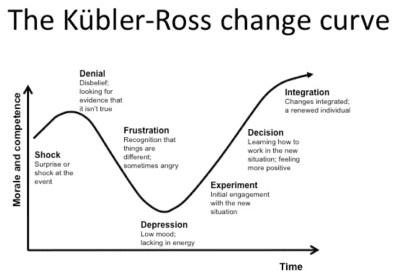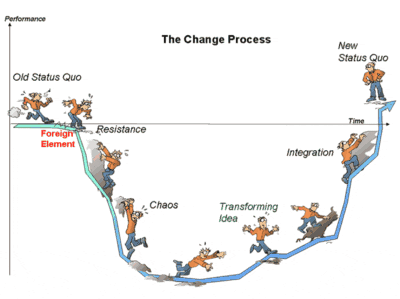The dark side of change management
Change is Hard
Sunday, July 9, 2017
The Problem?
The most common reason we are being given: Change is hard, change is difficult, and us human beings simply don’t want to change, we resist it. By default.
(See Exhibits A, B, and C below or google “change curve” for more evidence if needed)



The Solution?
The solution most change management theories propose? Take out the stick and spread fear. Instill a sense of urgency, light up the burning platform, remind everybody that the iceberg is melting.
Bottom line:
“Change or die.”
It’s as simple as that. (Although I never saw somebody actually die in an organization when they didn’t change. More often than not, it’s the change initiatives that die first.)
The implicit message we’re giving people is that, whatever they are doing right now, is crap. The behavior of the organization and the people working within it have led to the situation that the organization is facing. Despite all their efforts and best intentions, they’re faced with death, extinction, or at least a significant threat to the organization’s, and hence their, survival. “We (managers always tend to say ‘we’ when talking to their employees about these things, although they mostly mean ‘you’) are too slow, too bureaucratic, too…., not agile, not flexible, not creative, not innovative, not… enough.”
Bottom line:
“Everybody else is better than you losers.”
As up to 87% of employees across the globe are not engaged at work (), it might be safe to assume that people are not happy with the way things are going in organizations. Might it, as a consequence, be safe to assume that they do want to change? (Some might answer that they don’t care. In my experience that’s usually because they have proposed changes many times, which were always dismissed. “We tried this. It doesn’t work here. No budget. Too complicated….”)
What if…?
So what if, instead of instilling fear, we showed our colleagues that we’re serious about change, that we listen to their ideas. What if we engaged them in creating a compelling picture of the future? Something that has the power to pull them towards the change, instead of beating them with our sticks. What if, we honored their efforts (past, present, and future), instead of giving them the feeling of being losers?
Originally published at https://www.linkedin.com on July 9, 2017.



